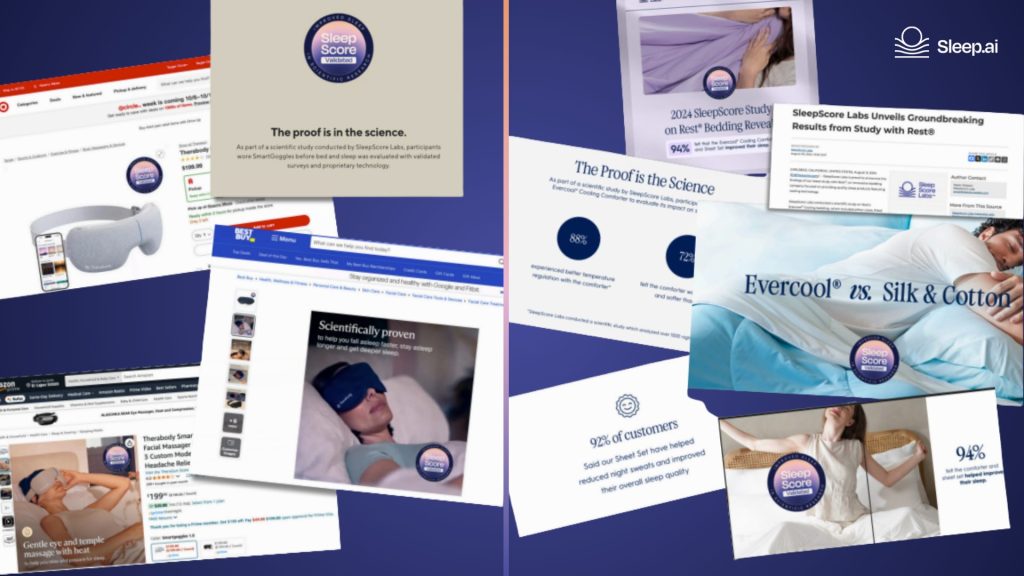
Blog
Validation Marketing: Why Your Study Should Be Your Strongest Sales Asset
When brands invest in scientific validation, they often focus on the study itself: the methodology, the metrics, the seal. But…
Introducing SleepScore
We deliver accurate data, actionable insights, personalized coaching and proven outcomes your customers need.
Sleep Insights
Last Published on 30th March 2022 by SleepScore Labs

According to the National Safety Council (NSC), a company with 1,000 employees can lose up to $1 million annually to employee fatigue resulting from poor sleep.
While some employers are getting wise and taking steps to invest in their employees’ sleep health, there’s a huge need to help employees prioritize sleep, for everyone’s benefit. Just look at the abundant evidence that suggests the tremendous effect optimal sleep can have on productivity, healthcare costs, presenteeism and absenteeism, and the company’s profits. That’s not to mention the untold benefits of sleep on an employee’s overall well-being outside the office, which can make them happier both during their 9-5 life and outside it.
It’s no wonder that the World Economic Forum (WEF) recommends that employers put in resources to tackle sleep deprivation in their organization for positive outcomes like higher productivity and lower healthcare costs.
Sleep is a prerequisite for optimal daytime functioning. When you don’t get enough restorative sleep at night, you may struggle with performing at a productive pace. You might even catch yourself dosing off on a task, losing concentration on the most mundane activities, and feeling tired and groggy all day long.
Let’s look at the relationship between sleep quality and workplace performance, the effect of poor sleep on performance, and what steps organizations can take to help their team improve their sleep health.
Sleep is a process that restores, recharges, and refreshes the body and mind. A person’s sleep needs vary based on genetics, health status, stress levels, etc. The Centers for Disease Control and Prevention (CDC) states that adults get seven or more hours of sleep for optimal health. Yet, one out of three US adults doesn’t achieve this recommendation.
Sleep directly impacts how well a person functions during the day. Studies suggest that a person’s productivity, physical and cognitive functioning, emotions, and behavior at work may be linked with the quantity and quality of sleep they get at night.
When people can’t maximize their time during the day due to fatigue, daytime sleepiness, or slow cognitive processing, they may be tempted to lose a few hours of sleep to finish up due projects. Often, losing sleep to meet work demands leads to a vicious cycle of insufficient sleep and impaired performance at work.
Worse, poor sleep has severe long-term consequences like increased risk of cognitive decline, metabolic disorders, mood disorders, stroke, and heart diseases. Research suggests that these chronic illnesses are associated with higher fatigue levels, absenteeism, hospital visits, and reduced flexibility, productivity, and performance at the workplace.
Sleep deprivation shows debilitating effects on individuals and how they carry on their day-to-day activities at work.
A review published in the Journal, Frontiers in Psychology, examined how sleep habits and sleepiness affect workplace behaviors from these key areas.
Insufficient sleep or poor-quality sleep may disturb a person’s ability to work at a healthy capacity. A person who’s had a non-refreshing night’s rest may experience cognitive symptoms such as:
These symptoms may affect a person’s work output, make them prone to making mistakes, increase the risk of workplace injury, lower motivation, and decrease work-related productivity.
Interestingly, a large 2013 study with 268,332 participants observed that employees with sleep problems were almost two times more likely than their counterparts to experience workplace injuries. They also found that poor sleep was associated with a 13 percent increased risk of work injuries.
Authors of a 2012 study found that insomnia may result in increased workplace accidents, excess absenteeism, increased feelings of unproductivity in the workplace, poor career progression, and lower job satisfaction.
Sleep loss may alter how a person processes emotions and situations and impair their ability to understand social cues and respond appropriately.
When a person has a distorted or irrational view of their situation or an event at work due to poor sleep, it may lead to miscommunication, conflict, or misjudgment with colleagues.
Plus, studies show that poor sleep may lead to mood changes. The person may manifest signs like anger, aggression, impulsivity, tantrum behavior, and inappropriate social interactions, affecting workplace relationships.
On the bleaker side of things, some of the world’s most devastating tragedies happened in part due to sleep deprivation. The Challenger explosion of 1986, Exxon Valdez oil spill of 1989, and several regional train crashes were all in some way related to employees making mistakes that contributed to these disasters, resulting in untold costs environmentally, financially, and to human lives.
Quality sleep is associated with good health. A person who lacks well-rested sleep is at risk of short term and long-term health consequences, including:
These conditions may lower a person’s health and quality of life and affect a company’s growth potential in the long term.
Poor sleep is expensive. Apart from costing individuals optimal physical, cognitive, and emotional health, it may also drain companies and the economy of millions of dollars that would have been saved from improving sleep health.
Data from the NSC shows that employers with up to 1000 workers lose about $1 million lost each year to fatigue-related costs, including absenteeism ($272,000), presenteeism ($776,000), and healthcare costs ($536,000).
A report from RAND suggests that the US loses about 2.28 percent of GDP (up to $411 billion) to insufficient sleep, and increasing sleep duration to 7 or more hours may translate to $226.4 billion for the economy.
All hands must be on deck to improve sleep health in the workplace. Employers and employees should consider appreciating the importance of optimal sleep health for individual performance at the workplace and the company’s success in the long term.
A 2019 review by National Institutes of Health recommends the following ways employers can support their employees’ sleep health:
Individuals can also enact these habits to optimize their sleep health which may lead to better productivity and performance at work:
Prioritizing your sleep health is one of the best things you can do to improve your performance in the workplace. Consider adopting sleep hygiene practices to improve your sleep quality and overall wellbeing.
Companies who put their employees’ sleep health first may experience positive outcomes like reduced absenteeism rates, increased productivity, lower healthcare costs, reduced workplace accidents, and improved work performance. Employers should consider creating interventions that promote their workers’ sleep quality to enjoy these benefits.